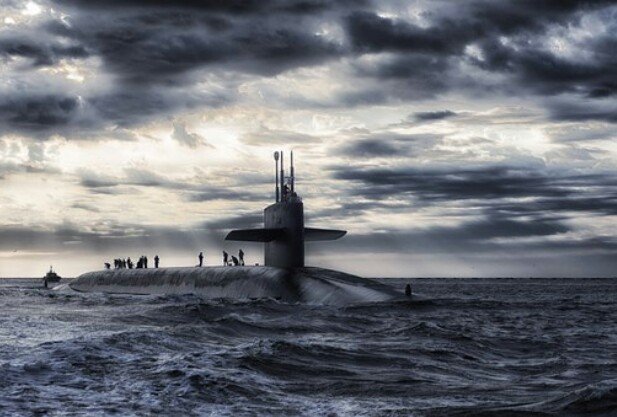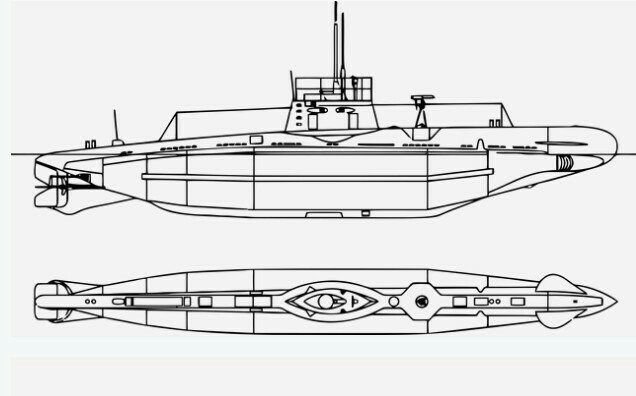I’m sure you probably would have seen a submarine on television or in movies?
But Have you ever imagined been on board a submarine deep beneath the sea, in freezing cold water for a whole month with about a dozen people?
Does that excite or just frighten you?

submarine from pixabay under CCO license
Submarines are unarguably one of the most fascinating inventions and were originally developed majorly for the military for anti-surface ship warfare to sink enemy ships, disrupt supplies and enemy operation. They were very effective during wars because they were very difficult to detect and they could attack both on the surface and beneath the surface of seas and oceans. With the invention of submarines, the world below the sea that was once peaceful became a heated battleground.
Submarines are exceptional because they can control their buoyancy and captains of submarine can decide when the submarine surfaces or sinks into the depth of the ocean or sea at will. Unlike ships that are easily detected Submarine move swiftly and quietly through the calmer waters underneath and cause major damages undetected. It is an important machine for military as It can detect and monitor the activities of targets without been detected, deploy and recover military personnels from target areas.
However, With the advancement of technology submarines have become more adaptive and effective, now they can stay submerged for longer period of time and sailors and personnel can live under water effortlessly for several months when carrying out operations such as long term surveillance intelligence gathering activities.
To deter surprise attacks from other nations submarine play an important role because they can be used as a strategic missile launch platform. While the submarine is submerged and hidden in a quiet part of the ocean it can receive a launch command at a moment notice.
Although most of the submarines are mostly used by the military however submarines also find use in other civilian activities such as scientific research purposes, oceanography, wreck exploration and recovery, tourism, pipeline surveys, oil and gas platform inspection.
I am sure by now you are eager to know more about this magnificent piece of technology called the submarine.
So are you ready to dive deeper with me to explore the world of submarines?
Let’s start with the most obvious question, how to submarines control their buoyancy (the tendency of a submarine to sink, rise or float at certain depth)

submarine from pixabay under CCO license
To maintain buoyancy submarines, make use of ballast tanks and trim tanks.
The ballast tanks are empty spaces between the outer and inner covering of the submarine. While The Trim tanks are the tanks at the front of the submarine which allows the pilot to keep the nose of the submarine upward or downward. They can be filled with either air or water and they help the submarine to have control over its buoyancy especially during the first part of the dive or a return to the surface from depth.
For instance, when the submarine is on the surface, the ballast tanks are filled with air with the use of highly compressed cylinders such that the overall density of the submarine is less than that of the surrounding water. As the submarine dives into the water, the Valves are opened and the ballast tanks are filled with water and the air in the ballast tank are vented from the submarine thereby increasing the weight of the submarine, so when the overall density of the submarine is greater than that of the surrounding water, the submarine begins to sink. Negative buoyancy is achieved thereby resulting in the downward movement of the submarine
Likewise, when the submarine wants to make an upward movement to the surface, with the use of highly compressed cylinders the ballast tanks are filled with air while water is ejected out of the tank thereby reducing the average density of the submarine. So the submarine achieves Positive buoyancy and thereby resulting in the upward movement of the submarine.
However, to keep the submarine at a certain depth, the submarine would maintain a balance of air and water in the trim tank, this would ensure that the overall density is equal to the surrounding water which is referred to as Neutral buoyancy
In cases of emergency the ballast tanks are filled with high pressure to help the submarine surface very quickly.
Another important part of the submarine that facilitate its easy movement is the hydroplanes.Hydroplanes are movable sets of short wings on the stern (back) that is used by the submarines to control the angle of the dive. The hydroplanes are angled such that water moves over the stern and this forces the stern upward, so the submarine is angled upwards. The amount of lift generated is dependent on the angle of tilt as well as the submarines speed. When the submarine reaches its cruising depth, the hydroplanes are leveled such that the submarine travels on the same level through the water
ENGINE OF A SUBMARINE
The operation of the engine of a submarine is quite different from the operation of gasoline engines, diesel engines used by automobiles or jet engine used by jets primarily because gasoline and diesel require a supply of oxygen from the air to make them function however under water its completely different because there is virtually no air so large military submarines are nuclear powered since air is not needed for it to operate. The submarines have small nuclear reactors that generate power to drive the electric motors and propellers regardless of where they are either at the surface or deep underwater.
However, diesel Electric engines are also used and they operate basically when the submarine surfaces or is cruising just below the surface, the diesel engines powers an electric generator that charges huge batteries and it doesn’t just power the submarine’s propellers directly. In this case once the diesel engine fully charges the batteries, the submarine switches off the electric engine and its only then that the submarine can go underwater and at this point it relies totally on battery power. Battery operation is the only way a diesel submarine can actually submerge and this puts a huge limit to the duration of time a diesel submarine can stay underwater.
The deeper the submarine goes down the darker it gets because light doesn’t travel well in water and cannot penetrate very far into the oceans and so submarine captains can’t see where they are headed so to locate a target a submarine is equipped with top notch navigational equipment and charts.
The latitude and longitude can be accurately determined by the Global positioning systems (GPS) when the submarine is on the surface, however the GPS cannot function when the submarine is submerged. Due to this the submarine makes use of inertial Guidance systems which is a way of using gyroscopes to keep track of how far the submarine has travelled, as well as its direction without making use of outside information although it can be accurate for just a period of time and its needs to be corrected using GPS, radar or other data after a period of time.
To locate a target the submarine uses active and passive sound and navigation and Ranging (SONAR)
For the case of Active sonar, it emits pulses of sound waves that travel through the water reflect off the target and return back, so with the knowledge of the speed of sound in water and the time taken for the sound wave to travel and return back, computer can effortlessly calculate the distance between the submarine and the target. While passive sonar listens to the sound generated by the target.
I’m sure by now you would be wondering how the Crew survives since they are confined to the submarine deep down in the oceans with limited supply of air?
Living on a submarine might sound very exciting but then it comes with its own challenges since the submarine is an enclosed vessel. So for humans to comfortably live in a submarine for long duration of time maintaining the Air quality, fresh water supply and temperature of the submarine is of utmost priority.
When we breathe in air, our bodies consume oxygen and convert it to carbon dioxide and then we exhale it. So to ensure the air in the submarine is breathable oxygen has to be replenished as it is consumed because a person would suffocate if the percentage of oxygen falls below a certain level in the submarine
Pressurized tanks could be used to supply oxygen or Since water is readily available and electricity is available, so by method of Electrolysis takes place which involves separating oxygen and hydrogen by passing DC current to water. So depending on the system used a computerized system can have used that senses the percentage of oxygen in the air within the submarine and would release oxygen continuously or when needed when oxygen could be released at several intervals during the day.
Carbon dioxide becomes toxic as its concentration increases, so exhaled carbon dioxide must be removed from the air within the submarine. So Carbon dioxide is removed using scrubbers which are devices that chemically use soda lime to trap carbon dioxide and remove them from the air
Exhaled moisture must also be removed and this is achieved by using dehumidifier or by chemicals. This is really essential because it stops the moisture from condensing on the walls or equipment within the submarine
Filters are used to remove dirt, particles and dust from the air and for cases where other cases such as hydrogen carbon mono oxide are generated by equipment, cigarette smokes within the submarine they can be removed using burners.
Submarines are electrically heated to ensure that the temperature within the submarine is fit for living.
Human cannot live long without water so for the crew to stay healthy fresh water is required. So Most submarines have a distillation mechanism that heats sea water to water vapor, which removes salts and it cools the water vapor into a collecting tank of fresh water which can be used by the crew for drinking, personal hygiene and cooking. Another important use of this fresh water is for cooling the electronic equipment such as computers and navigation equipment.
CONCLUSION
Submarines are one of the most fascinating inventions, they facilitate travelling under the sea surface to Explore the depth of the ocean as well as carry out various military operations while providing a favorable condition for the crew to live without any threat to their life.
Now that you understand the operations of a submarine, would you like to be on-board a submarine?
To the question in your title, my Magic 8-Ball says:
Hi! I'm a bot, and this answer was posted automatically. Check this post out for more information.
Congratulations! this post got an upvote by @steemrepo and was manually picked by the curator @yanosh01 to be added on STEEM REPOSITORY, simply comment "YES" and we upload it on STEEM REPO Website.
Want to know more about the Steem Repo project? Contact us on Discord
YES
This would require an intensive research from your part. Wow! Good work, bro.
And thanks for bringing this to us.
No kidding man.... It took a while to finish this!
Thanks for stopping by @abumaryam
Congratulations @dannybravo94! You received a personal award!
You can view your badges on your Steem Board and compare to others on the Steem Ranking
Vote for @Steemitboard as a witness to get one more award and increased upvotes!